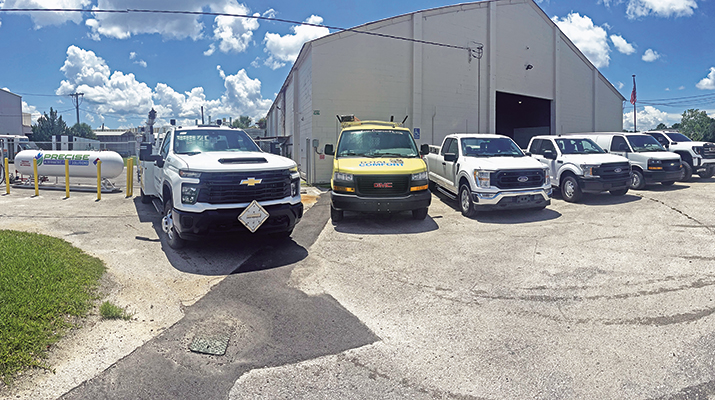Top autogas trends in 2024 and beyond

Accessibility and performance make autogas an attractive option for fleets. (Photo by Ronny Martinez)
As propane marketers reflect on the past year and prepare for 2025, a variety of autogas market trends have arisen during the past few months.
In particular, there’s no sign of a decrease in autogas’s popularity. Instead, the opposite has proven to be reality, as vehicle fleets continue to reap the benefits of the alternative fuel.
To learn more about the latest developments in autogas, LP Gas spoke to five subject matter experts, who discussed the following trends.
A shift away from diesel and electric vehicles
Due to the expenses associated with diesel maintenance, fleets have been switching from diesel to gasoline, according to Josh Budworth, vice president of business development for Alliance AutoGas.

Budworth
“That change has left a great business case for us, and we have been able to help fleets two-fold by converting their fleets to our EPA-certified, bi-fuel propane system (propane and gasoline) while saving them money on fuel expenses,” Budworth says.
While looking ahead to 2025, Budworth believes fleets will move away from electric vehicles (EVs) as well, as the EV market has revealed several downsides, including a lack of charging options, high prices and production suspensions.
“Schools, transit companies, service industries and package delivery organizations will lean more and more toward alternatives like autogas to meet tougher sustainability goals and requirements,” he adds.
Steady growth in 2024 – and after
As a result of this shift, the autogas market experienced consistent growth this year, as it “solidified its position as a reliable and viable fuel option for fleets,” according to Ronny Martinez, CEO of Precise Alternative Fleet Solutions.

Martinez
Two key reasons stand out to Martinez: Autogas doesn’t rely on tax incentives exceedingly, and it doesn’t require considerable upfront investment to demonstrate its value to customers. It is practical, offers immediate cost savings and provides long-term benefits – without the need for large-scale financial commitments.
“Its consistent performance and accessibility make it an attractive option for fleets today and for the foreseeable future,” Martinez says. “The adoption of autogas – for gasoline-powered work trucks, buses, school buses and even port trailer switch trucks – is expected to continue.”
Martinez’s predictions are backed by third-quarter sales, which were higher than usual this year, he says.

Rimko
“Usually, autogas sales pick up in the second quarter, but this year, they picked up in the last couple months, which may be a sign that we’re gaining additional customers outside of the school bus market, as this isn’t their traditional buying season,” says Derek Rimko, vice president of operations at Superior Energy Systems.
Albert Venezio, CEO of Icom North America, has noticed a rise in autogas customers, too. In particular, he has seen more school and shuttle buses use the alternative fuel in the United States and Canada.
“In turn, more propane companies are moving to autogas, as well,” he says.
At the same time, he believes interest in renewable propane has grown. Likewise, customers’ interests in propane engines, especially for power generation, are also rising in many countries.

Venezio
“This will likely continue in 2025 – and beyond,” he stresses.
Due, in part, to EV deployment expenditures and diesel prices, Todd Mouw, executive vice president of Roush CleanTech, agrees with Venezio, adding that propane is a “viable long-term solution.”
“Over the next few years, propane should garner a much larger portion of the school bus market,” Mouw says. “By the end of the decade, within the class 4 to 7 commercial truck and school bus sectors, it may be a two-horse race with propane and electric.”
The rise of renewable propane
As Rimko reflects on trends within the autogas market, he points to renewable propane and its emission-reduction capabilities, leading to the rise in autogas’s popularity.
While striving to minimize their carbon footprint, customers have increased their requests for renewable propane infrastructure setups, he says. Superior Energy Systems has responded to the requests, as renewable propane performs just like conventional propane – and, therefore, requires the same refueling equipment.
Mouw believes propane marketers should focus on renewable propane’s emission-reduction capabilities. After all, renewable propane’s carbon index scores are considerably better than many of the electric grid’s scores.

Mouw
Produced from renewable sources like biomass, vegetable oils and waste products, renewable propane offers three benefits, in addition to greenhouse gas emission reductions, according to Martinez:
- Energy independence. Since renewable propane can be produced from domestic renewable resources, it diminishes the propane industry’s reliance on fossil fuels.
“This aspect makes it appealing in regions looking to increase the use of homegrown energy solutions, potentially leading to broader adoption across industries,” Martinez says. - Enhanced market appeal. As governments and industries strive to implement greener energy solutions, renewable propane will only increase autogas’s potential use in a variety of applications.
- Infrastructure compatibility. Due to renewable propane’s similarities with conventional propane, it can be used with customers’ existing autogas infrastructure and vehicles – without requiring modifications. Consequently, fleets can easily transition to using renewable propane.
“By combining autogas’s economic benefits with renewable propane’s sustainability, the propane market will be able to attract a broader range of fleets and industries, driving growth and innovation,” Martinez says.
















